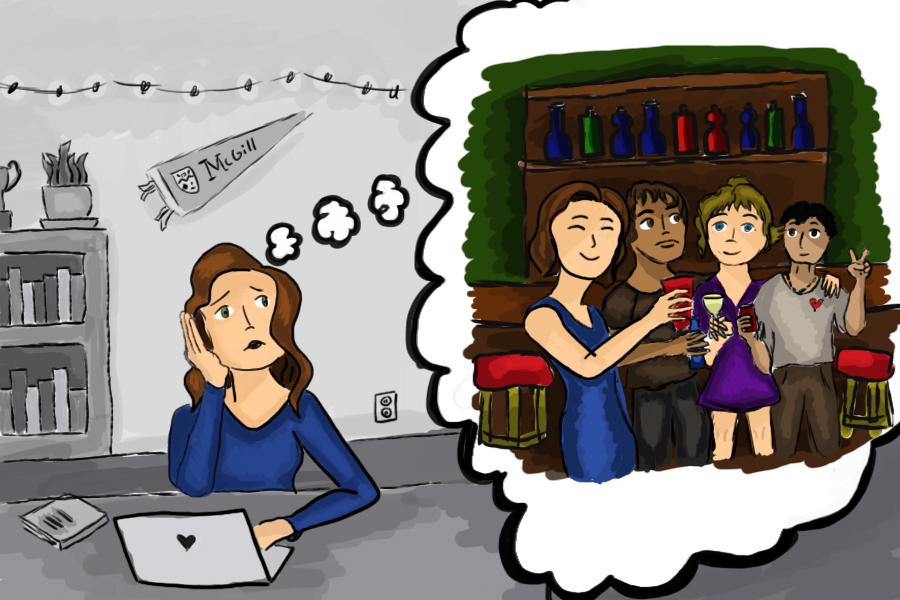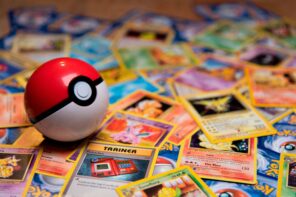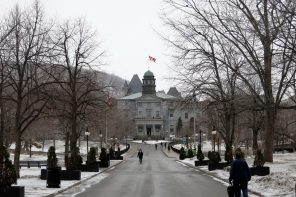This story was first published in Going the Distance, the Bull and Bear’s Fall 2020 print issue.
“We didn’t appreciate what we had until it was gone.”
When COVID-19 guidelines forced classes online and restricted group gatherings, Chair of AUS Bar des Arts (BdA) Gabrielle Lametti was disappointed and saddened, remembering how important regular social events like BdA were to her student experience.
“Having that weekly routine, that expectation of being able to relax, and socialize … really helped me personally feel more comfortable at McGill,” Lametti recalled.
Lametti’s disappointment reflects a Fall 2020 semester that requires adapting to new circumstances: while all university classes are now taught through remote delivery, McGill’s student life experience has struggled to adapt in a similar manner.
Restrictive provincial regulations and the eventual October 1 red zone regulations that prohibited all indoor gatherings squandered students’ hopes of maintaining some semblance of a traditional McGill social experience.
In recent years, drinking and partying have remained central tenets of McGill’s infamous “work hard, play hard” student experience. Student-run events that include social drinking such as Frosh Week, Hype Week, Carnival, Bar des Arts, and many others are important to fostering community at McGill. For many, including BdA VP Social Grace Jumbo, events like BdA were a central means of meeting and connecting with new people.
“People really live for having somewhere to go, seeing all their friends at once, and meeting new people, too,” Jumbo said. “I know a lot of people who told me ‘I have met a lot of people I know to this day, roommates that I love, that I met at BDA.’ It definitely builds a community.”
The experience that Jumbo describes is entirely different for first-year students this semester, who have had to find ways to make friends and connections without the traditional means of partying and events.
“Coming from Toronto, I heard so much about the community that forms in Upper Rez” noted U0 Science student Charli Starkman. “I was really looking forward to that.”
‘Upper Rez,’ as the McConnell, Molson and Gardner residences are collectively referred to, is known for its culture of partying and the community that forms through its various social events, such as common room “pre-drinks.” Starkman said that she was lucky to have mutual friends in her residence, La Citadelle, whom she became close with, but not all first-years have that luxury.
According to Starkman, first-years explored new avenues of going out at the beginning of the semester, booking tables at Le Warehouse and Suwu on St. Laurent. “They still had a D.J. at Le Warehouse, and you could dance at your booth.” However, Starkman noted that “Once you’re inside they were pretty strict. One time I was asked to leave because I switched tables.”
When Starkman was asked if she had ever visited clubs popular among McGill students, such as Tokyo, Apartment 200, Ecole, or Kampai, she was barely familiar with the names of these institutions and did not believe she had ever visited.
First-years are not the only ones struggling with social restrictions. Lametti says that the lack of social events is affecting upper-year students just as much, if not more.
“For upper-year students who live alone, or have few roommates, or roommates they’re not really close with, that sense of loneliness and difficulty to connect with others must really be weighing on them right now,” Lametti said. “So we’re really hoping to send a message that the community is there even though we can’t see it right now.”
U1 Arts student Jessie Alexandor sympathizes with Lametti’s thoughts, saying that continuing to foster friendships with the people she met in first-year has been difficult to do during lockdown.
“There are a lot of people that I wish I could see, and I can kinda feel myself falling out of touch with certain people,” Alexandor said. “But it’s a common struggle, so hopefully it’ll go back to normal quickly.”
The lack of social interaction affecting many students, including Alexandor, is not only due to the absence of student-run events this semester. Another key aspect of McGill’s social scene is spending late nights partying in the bars and clubs of St. Laurent: this experience plays a significant role in helping students, especially first-years, build communities and establish long-lasting friendships. “Going out played a big role in acclimating,” Alexandor said.
Evidently, night life was a central tenet of many students’ social lives. The new restrictions and lack of similar opportunities to see and meet friends has required adjustment on the part of many.
“We practically lived on St. Laurent [last year],” U1 engineering student Evan Wechsler said. “I walked through there yesterday and I can’t believe how much time we spent there. It’s really strange not being able to see our friends as frequently as we did last year.”
McGill students aren’t the only ones missing the nightlife on St. Laurent. The bars and nightclubs miss McGill students in return, as the last eight months of forced closure have brought severe economic consequences.
According to Cafe Campus Coordinator, JF Beaudoin, the popular club — which has been closed since March — is worried about the financial impact of the pandemic.
“We were very concerned,” Beaudoin said. “The bank account is shortening … our plan was to stay put and save our money to make sure we survive this crisis. It depends on the next protocols from the authorities, but right now it is better to stay closed.”
Similarly, Phil Allard — who is part of A5 Hospitality, the group that owns Kampai, Ecole, Suwu, and Apartment 200 — noted that Kampai has lost 95 per cent of sales since the start of the pandemic since being reduced to only serving takeout. Even though Kampai went from “running at full capacity to nothing,” Allard says Kampai, along with the other clubs and bars he owns, will be fine due to the number of owners and size of the business.
While Cafe Campus, Kampai, and other larger businesses aim to reopen in the future, other, smaller clubs on St. Laurent have not been so lucky. On October 26, Tokyo Bar officially announced that it had permanently closed.
DJ J-FRO, a staple of Tokyo’s lineup for the last 12 years, is sad to see the institution shut its doors, speaking of how Tokyo maintained a primarily student-based audience over its 23 years, noting that Tokyo’s ‘wild’ Thursday nights kept students coming back week after week.
“On Thursdays, people would be dancing on the bar because the club was too full,” J-FRO said. “I’ve seen bodysurfing; anything goes on Thursdays.”
But aside from the partying, DJ J-FRO is sad to know his nights at Tokyo are behind him. “I’ve worked at many places, and Tokyo is one of the only places that as an employee I could give a hug to everyone before the shift started, and again at the end of the night before the staff left.”
Despite the loss of Tokyo, Beaudoin doesn’t think the permanent closures of popular bars and clubs on St. Laurent will affect Montreal’s nightlife and culture in the long-term.
“I don’t think it’s going to change,” Beaudoin said. “I think a lot of businesses are going to close, but a lot of businesses are going to open when it’s over. It’s just a change of hands.”
But DJ J-FRO doesn’t seem so sure. “Tokyo was one of the first places to publicly announce that they were closed. Despite Tokyo’s history and reputation, they are gone. How many places are gonna go in the next three months? It’s just a matter of time.”
Even if clubs and bars eventually reopen at full capacity, students harbour concerns about gathering in a club with hundreds of strangers once again.
“It’s hard to even imagine that we would put ourselves in a room with 300 other people that we didn’t know and just not care at all,” Wechsler said.
Echoing Wechsler’s thoughts, Alexandor expressed concerns about adjusting back to a very social environment after being isolated for so long. She says she’s “nervous,” but hopes “everyone will get used” to going back to clubs, and spending time in large social settings when restrictions are eventually lifted.
Beaudoin shares this sentiment, drawing parallels between the COVID-19 pandemic and the Spanish flu. “After the 1918 pandemic, there was the Roaring 20’s,” Beaudoin noted, saying that the only changes he foresees at Cafe Campus are the possible implementation of increased sanitary measures.
“When the crisis is really over, it’s going to be like before,” Beaudoin said. “Our customers are young and will forget very, very quickly. I think all of society will change, but in a fun place like ours, without old people, you’ll forget all that. It’s going to be like before.”
Beaudoin’s optimism is reflected by Allard, who thinks that “the moment we’re able to open our doors, people will come back because people love to go out and see their friends.”
However, DJ J-FRO thinks club goers will be more cautious upon their return to St. Laurent. “If everything went back to normal tomorrow, I’d be more cautious about who’s partying around me. If someone randomly grinded on me: I don’t know how I’d feel about that anymore.”
Even though DJ J-FRO and some students are apprehensive, Jumbo thinks first-years will be the ones to rebuild McGill’s social community, including events like BdA, Frosh, Carnival and Hype Week, after the pandemic is over.
“They’re going to come out resilient and hopefully it’ll be them in the end who builds these things back up to make them what we want them to be,” Jumbo said. “And hopefully with the guidance of some people who are older who can tell them how it was, they can get all these great things and figure out how to plan them … to make sure everyone feels welcome at McGill.”
In general, the sentiment among club associates, student event organizers, and students is that there will be a significant effort to return to a normal McGill social life as soon as it is safe to do so.
“Hang in there,” Jumbo said. “It’s going to get better. People are working on these things [BdA, Frosh, Carnival, Hype Week]; we’re ready when Canada’s ready, and Quebec is ready.”
Beaudoin feels the same way, and he guarantees that after the pandemic is over, Cafe Campus will still be there for any and all students who want to return to partying on St. Laurent.
“For the McGill community, we’re saying we’re going to open for sure, someday,” Beaudoin said. “We’re going to be there. We’re maybe going to be poor, but we’re going to open.”








